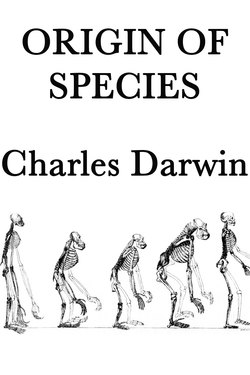Читать книгу Origin of Species - Чарлз Дарвин - Страница 31
На сайте Литреса книга снята с продажи.
Extinction caused by Natural Selection
ОглавлениеThis subject will he more fully discussed in our chapter on Geology; but it must here be alluded to from being intimately connected with natural selection. Natural selection acts solely through the preservation of variations in some way advantageous, which consequently endure. Owing to the high geometrical rate of increase of all organic beings, each area is already fully stocked with inhabitants; and it follows from this, that as the favoured forms increase in number, so, generally, will the less favoured decrease and become rare. Rarity, as geology tells us, is the precursor to extinction. We can see that any form which is represented by few individuals will run a good chance of utter extinction, during great fluctuations in the nature of the seasons, or from a temporary increase in the number of its enemies. But we may go further than this; for, as new forms are produced, unless we admit that specific forms can go on indefinitely increasing in number, many old forms must become extinct. That the number of specific forms has not indefinitely increased, geology plainly tells us; and we shall presently attempt to show why it is that the number of species throughout the world has not become immeasurably great.
We have seen that the species which are most numerous in individuals have the best chance of producing favourable variations within any given period. We have evidence of this, in the facts stated in the second chapter showing that it is the common and diffused or dominant species which offer the greatest number of recorded varieties. Hence, rare species will be less quickly modified or improved within any given period; they will consequently be beaten in the race for life by the modified and improved descendants of the commoner species.
From these several considerations I think it inevitably follows, that as new species in the course of time are formed through natural selection, others will become rarer and rarer, and finally extinct. The forms which stand in closest competition with those undergoing modification and improvement will naturally suffer most. And we have seen in the chapter on the Struggle for Existence that it is the most closely-allied forms,- varieties of the same species, and species of the same genus or of related genera,- which, from having nearly the same structure, constitution, and habits, generally come into the severest competition with each other; consequently, each new variety or species, during the progress of its formation, will generally press hardest on its nearest kindred, and tend to exterminate them. We see the same process of extermination amongst our domesticated productions, through the selection of improved forms by man. Many curious instances could be given showing how quickly new breeds of cattle, sheep, and other animals, and varieties of flowers, take the place of older and inferior kinds. In Yorkshire, it is historically known that the ancient black cattle were displaced by the long-horns, and that these "were swept away by the shorthorns" (I quote the words of an agricultural writer) "as if by some murderous pestilence."
